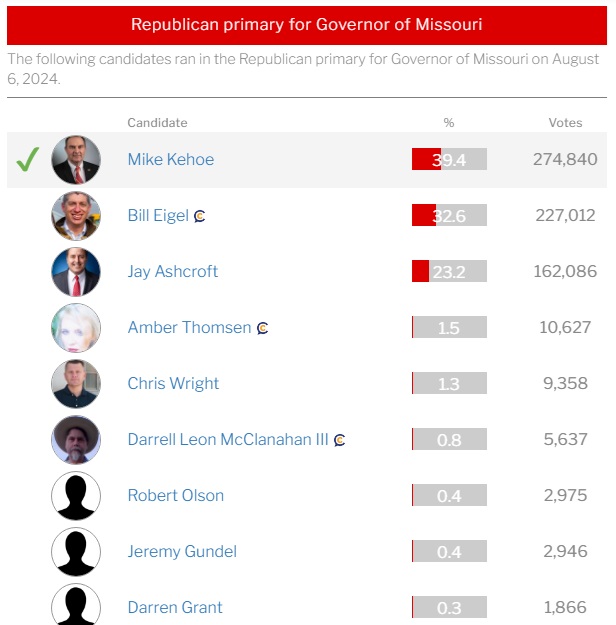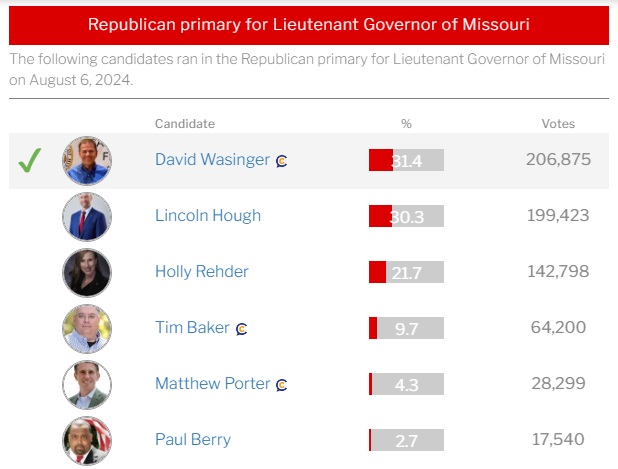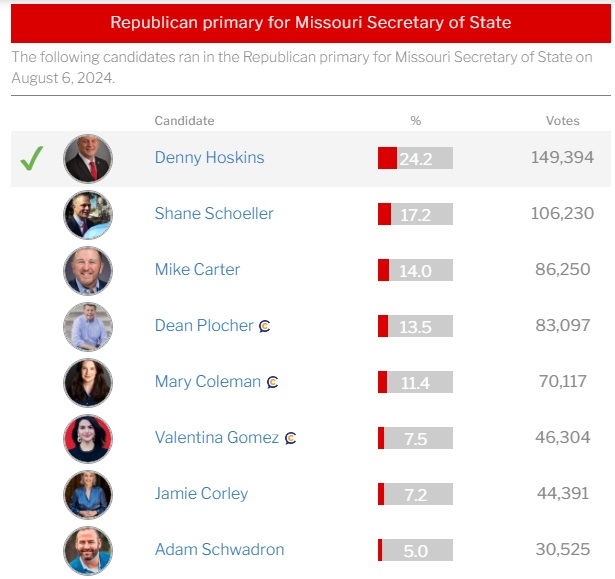Ranked Voting: The Case for Republicans
Republicans are Already Using Ranked Voting
From CBS News: the GOP in the Virgin Islands used ranking in their presidential primary. This video also explains how ranking works.
Utah used ranked voting in for their presidential caucuses this year:
Straight Arrow News points out that the method of selecting U.S. House Speaker Mike Johnson basically used ranked voting:
The MO Primaries Show the Value of Ranked Voting for Republicans

Mike Kehoe got less than 40% of the vote. Would those who voted for other candidates have given him second or third rankings, enough to give him majority support in the final round? If so, his case in the general election would be stronger. Since ranking is used in over 50 U.S. cities now (20 in Utah alone), we know that this is what happens about 4 times in 5 – the candidate with the most votes in the first round of counting still has the majority in the final round.
But if those second and third preferences would have gone to Ashcroft or Eigel, then they would rightfully claim they were the ones with majority support. We’ll never know, because we never asked.

The Lt. Governor race was close. The winner won by only 7,452 votes. There were 235,262 votes for three other candidates. Not only was it possible with ranking for the third place finisher to have leaped over the top two — without ranking, the votes of 235,262 voters were left twisting in the wind. They were unable to weigh in on the final results between Wasinger and Hough.
At the Missouri House hearing, one of the arguments the sponsors of Amendment 7 made was how ranking “disenfranchised” voters. Here is a clear example of how the current system is the one that causes that problem.

Note that the person who won the Secretary of State race did so with 24.4% — just under a quarter. Yet some of the other candidates also had substantial showings. How well are the voters represented when someone can win with so few votes?
Can we really decide the best candidate when it’s so arbitrary how many people run? The attorney general race had a clear majority winner, but there were only two people in it, so of course it would. With ranking, anyone who has the majority of first-preference rankings wins just like the current system.
Our Men and Women in Uniform
From Ranked Choice Voting Works for the Overseas Military. Why Not for Everybody? by Josh Daniels, May 2, 2024
When you’re serving your country overseas, remaining focused on the mission can be a matter of life and death. There’s little time for anything else, including exercising your right to vote. As a Marine combat veteran who served in Iraq, I know how hard it can be to vote while deployed: We must apply for a ballot, receive it in a foreign land, send it back and cross our fingers that it arrives on time. In my experience, many service members are unable to complete this process successfully and have their voices heard.
Now, imagine going through this series of deadlines a second time to vote in a runoff election.
Fortunately, six Southern states adopted an elegant solution that allows service members and their families living overseas to vote on Election Day and in runoffs using just one mailing: ranked choice voting. This simple tool has protected tens of thousands of military voters for years — in some of these states for decades.
RCV works. It’s simple and effective, and military members count on it.
Republican Quotes Supporting Ranking
Why ranked-choice voting is a win for Republicans
by Saul Anuzis, former chairman of the Michigan Republican Party
and Stan Lockhart, former chairman of the Utah Republican Party

The simple truth is that we’d have a better chance of capturing the presidency if we selected our nominee using ranked-choice voting. And a new Citizen Data poll shows that voters are on board — 61% of Republicans are interested in ranking candidates in such a crowded field.
Our traditional primaries seem to hurt Republican candidates again and again. Look at the Senate primaries in Arizona, New Hampshire and Pennsylvania last year. Republicans squandered tens of millions running negative ads against each other, Democrats meddled by donating to the least-electable candidates, and the “winners” in these contests earned only a third of the GOP primary vote. We lost badly in each state, and Democrats expanded their majority in the Senate . . .
Opinion | What We Can Do to Make American Politics Less Dysfunctional – The New York Times
by Yuval Levin, a senior fellow at the American Enterprise Institute

Ranked-choice voting in primaries could be particularly promising. A ranked-choice election allows voters to select multiple candidates in order of preference and then have their vote count on behalf of their second or third choice if their first or second choice is not among the top vote getters. In most forms, it is essentially an automatic runoff. From the point of view of candidates, such a system creates a strong reason to be many voters’ second choice, as well as the first choice of some . . . That . . . could do a better job of attracting candidates capable of broad appeal both on the campaign trail and in office . . .
Republicans tend to be more staunchly opposed to such proposals and to assume they would only benefit the left. The evidence so far does not support that assumption. As my American Enterprise Institute colleague Kevin Kosar argued in a recent paper, Republicans have particularly strong reasons to consider such reforms — at least in primaries.
Ranked choice voting is a good idea that deserves a tryout
Walter Olson, a senior fellow at the Cato Institute

Rank choice is a voting method grounded in common sense with a time-proven track record. It empowers individual voters to send a clearer message about whom they want to represent them. It helps elevate the candidates who are genuinely most popular with the public. Study after study shows ranking choices does not confuse voters, who find it easy to use.
In the system we are used to, sometimes called “first past the post,” you vote for one candidate, and whoever gets the most votes wins. That works fine most of the time. But it can mean a not-very-popular candidate who garners, say, 35% of the vote can slip through against a crowded field of opponents . . .
In the recent Alaska House special election, Mary Peltola, a Democrat with strong crossover appeal, prevailed in a three-way contest over Republicans Sarah Palin and Nick Begich. Peltola would have won outright without ranking and would probably have beaten former GOP vice presidential candidate Palin in a straight head-to-head contest, too.
For Palin, the best hope would have been to ask Begich voters for their second-choice votes. Instead, she denounced the new setup and asked voters not to rank candidates at all. That sealed her fate . . .
But right-leaning parties have done quite well in Australia and Ireland, both of which have used ranked choice voting for a century (and are among the world’s most stable democracies).
